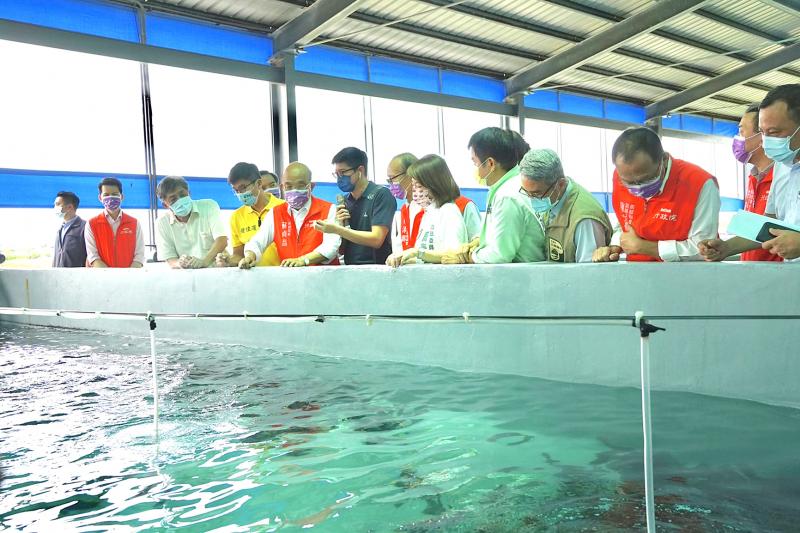A Chinese ban on grouper imports from Taiwan is both retaliation for a closer Taiwan-US relationship and an attempt to sway the elections at the end of the year, a government official familiar with cross-strait affairs said on Monday.
China on Monday banned Taiwanese grouper fish for allegedly containing banned chemicals and excessive levels of oxytetracycline.
Chinese authorities in January announced that they had found residues of illegal veterinary drugs in two batches of grouper imported from Taiwan.

Photo courtesy of the Pingtung County
The two batches were from three fish farms and were shipped to China on two vessels, Fisheries Agency Deputy Director-General Lin Kuo-ping (林國平) said yesterday, adding that the agency has launched an investigation into the farms and would soon publish the results.
Taiwan exported about 6,681 tonnes of grouper last year, generating a production value of NT$1.68 billion (US$56.6 million), Council of Agriculture data show.
Grouper exports are highly reliant on China, where 91 percent of Taiwan’s exported grouper was sold last year, accounting for 36 percent of the total yield of the year, the statistics show.
From January to last month, Taiwan exported 3,059 tonnes of the fish to China and Hong Kong.
As grouper is on the cross-strait Economic Cooperation Framework Agreement’s (ECFA) “early harvest” list, Beijing’s intent is for the “economic sanction” to serve as a threat to other products on the list, the government official said.
“This is just the beginning,” the source said, adding that China is conspiring to make the Democratic Progressive Party (DPP) suffer a bruising defeat like it did in the 2018 local elections, as Taiwanese grouper is produced mainly in Tainan, Kaohsiung and Pingtung County, which have long been strongholds of the DPP.
The official said China was likely to ban other agricultural and fishery products imports from Taiwan and “resort to every means to cause chaos in Taiwanese society.”
Beijing’s intimidation is intended to warn farmers and fishers that their profits might be taken away if they continue to support the DPP, the person said, denouncing the measure as “mean” and calling it a form of political manipulation.
The ban is another example of Chinese cognitive warfare against Taiwan, as it not only targets local fishers, but also promotes the spread of pro-Chinese Nationalist Party (KMT) propaganda online, as well as rumors about problematic products from Taiwan, the person said.
As the Chinese Communist Party’s 20th National Congress is to be held later this year, the DPP winning local elections in November would be a cause of shame for Chinese President Xi Jinping (習近平), so Beijing’s “united front” efforts this year will be “fierce and ruthless,” which the government should be prepared for, the person added.

Taiwan is stepping up plans to create self-sufficient supply chains for combat drones and increase foreign orders from the US to counter China’s numerical superiority, a defense official said on Saturday. Commenting on condition of anonymity, the official said the nation’s armed forces are in agreement with US Admiral Samuel Paparo’s assessment that Taiwan’s military must be prepared to turn the nation’s waters into a “hellscape” for the Chinese People’s Liberation Army (PLA). Paparo, the commander of the US Indo-Pacific Command, reiterated the concept during a Congressional hearing in Washington on Wednesday. He first coined the term in a security conference last

Prosecutors today declined to say who was questioned regarding alleged forgery on petitions to recall Democratic Progressive Party (DPP) legislators, after Chinese-language media earlier reported that members of the Chinese Nationalist Party (KMT) Youth League were brought in for questioning. The Ministry of Justice Investigation Bureau confirmed that two people had been questioned, but did not disclose any further information about the ongoing investigation. KMT Youth League members Lee Hsiao-liang (李孝亮) and Liu Szu-yin (劉思吟) — who are leading the effort to recall DPP caucus chief executive Rosalia Wu (吳思瑤) and Legislator Wu Pei-yi (吳沛憶) — both posted on Facebook saying: “I

The Ministry of Economic Affairs has fined Taobao NT$1.2 million (US$36,912) for advertisements that exceed its approved business scope, requiring the Chinese e-commerce platform to make corrections in the first half of this year or its license may be revoked. Lawmakers have called for stricter enforcement of Chinese e-commerce platforms and measures to prevent China from laundering its goods through Taiwan in response to US President Donald Trump’s heavy tariffs on China. The Legislative Yuan’s Finance Committee met today to discuss policies to prevent China from dumping goods in Taiwan, inviting government agencies to report. Democratic Progressive Party Legislator Kuo Kuo-wen (郭國文) said

Sung Chien-liang (宋建樑), who led efforts to recall Democratic Progressive Party (DPP) Legislator Lee Kun-cheng (李坤城), was released on bail of NT$80,000 today amid outcry over his decision to wear a Nazi armband to questioning the night before. Sung arrived at the New Taipei District Prosecutors’ Office for questioning in a recall petition forgery case last night wearing a red armband bearing a swastika, carrying a copy of Adolf Hitler’s Mein Kampf and giving a Nazi salute. Sung left the building at 1:15am without the armband and covering the book with his coat. Lee said today that this is a serious